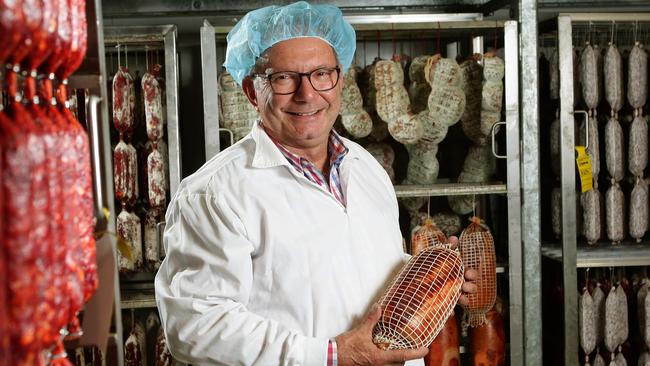Smaller food producers are finding shelf space as the giants struggle
THERE’S little doubt Australia’s food and grocery giants are struggling. You can see it with the difficulties of SPC Ardmona and more.

THERE’S little doubt Australia’s food and grocery giants are struggling. You can see it with the difficulties of SPC Ardmona, the takeover of Goodman Fielder, or the fight by Simplot Australia (part of the US giant) to keep open its canneries and frozen vegetable operations.
They face a variety of problems: high labour costs, imported competition (some of it dumped) and weather challenges. But the ongoing publicised problem that will not disappear is the supermarkets’ quest for cheaper prices and the ongoing squeeze on their suppliers.
The ACCC is investigating the relationship between supermarkets and suppliers and the recent review of competition law has a draft recommendation to beef up laws against large organisations trying to out-muscle small suppliers. The worst of the accusations is that big supermarkets allow small businesses into their supply-chain, only to delist the product in the future and move the product’s intellectual property onto another supplier.
But for all the struggles inherent in the supply-chain, the truth is that many small, nimble players are finding and keeping business with the supermarket giants. Much of this is driven by the supermarket-demand for private label and premium store-branded product.
The appeal for the smaller, modern operator is they can use technology or modern business practises to keep costs lower than established players. They can innovate and create a point of difference with competitors in the market.
Work done by the Australian Food & Grocery Council, which represent large and small food manufacturers, note there are 27,469 individual companies in the food and grocery business in Australia. Clearly, the vast majority of these are small or family run businesses, sharing to a greater or lesser extent in the annual industry turnover of $114 billion.
One key point from the AFGC’s report is that so-called Tier 2 participants (ie not the big manufacturers such as Nestle, Heinz, Goodman Fielder etc) tend to have lower exposure to the large supermarkets’ “deep discounting” (for this read price wars). Profit margins tend to be higher in the smaller Tier 2 players.
Like many parts of business, the trick to successfully supplying the supermarkets starts with the relationships between the people. Then follows the ability to produce a superior or unique product that is keenly priced (yet still sensibly priced to allow you to profit and grow).
It will also help if your product or technique is protected, or not vulnerable to being replicated by other fast-paced competitors.
But as we reported here last week, a shortage of maintenance engineers to support these smaller, emerging food manufacturers is strong evidence that food production is not dead and buried in Australia. Not by a long shot.
SALAMI SUPREMO FINDS HIS NICHE
ROLAND Melosi is a legend in smallgoods. If you like your salami, mortadella or prosciutto, then Roland is your man. For 10 years he’s judged the Royal Easter Show smallgoods awards. In the 1980s and 90s his family was the biggest seller of prosciutto in the country.
But Roland knows the harsh realities of business and the importance of timing. In 1992, Australia’s last recession, the family was forced to sell its 43-year-old business when its interest rates blew out to 23% while it was building a new factory.
Roland Melosi walked away from the industry he loved. He stayed away for 17 years. The G. Melosi brand, in the meantime, continued to prosper within the Don Smallgoods business owned by George Weston Foods.
Five years ago Roland decided to get back into the game. It says a lot that many of his former buyers remembered him.

“There is one, a young girl when I first knew her, that I taught to slice ham and mortadella,” he says. “Now she is the head smallgoods buyer for a big supermarket chain.”
This time around Roland understood he could not compete with the giant smallgoods companies.
Rather than having 200 staff, as the old business did, Montecanti Speciality Smallgoods has just eight employees. Roland had to be innovative to compete.
Thus was born the truffle salami and others with capers or fennel and garlic. The mortadella also got an overhaul.
“If the Spanish or the Italians ever open up and allow imports, we will be well ahead. We purposefully make products that are different,” Roland says.
Apart from innovation, Roland has also moved into the production and supply of private-label products.
To this end the truffle salami and others have become part of Woolworths’ top-tiered Gold range, which are hand- made by traditional methods and consist of only premium raw ingredients.
Roland’s experience shows that supermarket price wars, tough as they can be on suppliers, are also creating business for those nimble and creative enough to make innovative and affordable products.
As Roland himself says modestly: “I am an artist in smallgoods.”




